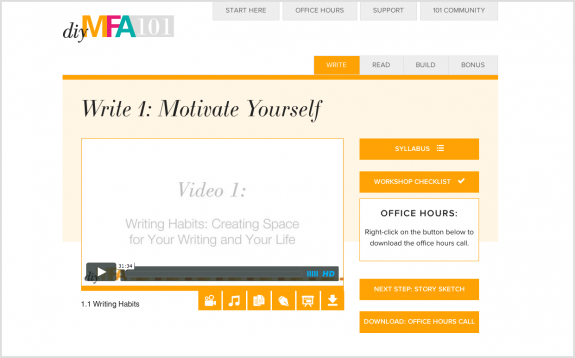Here’s a quick sneak peek of our flagship course DIY MFA 101. We have a private, members-only website for the class, with exciting features to make accessing the course materials easy.
The workshops unlock sequentially on different weeks of the class. Each workshop contains three video lessons with companion worksheets. We also include an audio-only version and written transcripts of the video, so no matter what your learning style is you can absorb the materials in a way that’s best for you.
Class Format
There are seven weeks of materials, plus two implementation or “review” weeks. New material goes live on Monday each week (except on review weeks), with class discussion and Q&A calls on Wednesday evenings. You don’t have to complete the entire module to participate in the calls, though. We encourage writers to work at their own pace and participate in as many calls as they can. Here’s a quick summary of what each week of the course will cover.
Week 1: Motivate Yourself
For any writer who has struggled to find motivation or time, the habit-changing tools in this workshop will be sure to boost your writing. We’ll teach you how to make the most out of the time you have and maximize your productivity. You’ll also learn techniques for planning your writing in advance, and you’ll get insights on how to bounce back from rejection. At the end of this workshop, you will be a more productive, efficient and resilient writer, ready to make strides in your writing and finish your book.
Week 2: Get Creative on Demand
Creativity is not some elusive, mysterious force; it’s a learnable skill. This week you’ll learn how to hone your creativity and generate ideas on demand. You’ll also learn that creativity is more than just coming up with ideas and is all about the follow-through. We’ll show you proven techniques for mastering the creative process in ways that will apply directly to your writing. When you complete this workshop you will have a creative toolbox well-stocked with techniques to tackle any project.
Week 3: Master the Craft
To kick off our study of craft, we’ll focus on the two elements that matter most: character and story structure. This workshop is chock-full of techniques that will help you improve your writing immediately in these two areas. Focusing on the nuts and bolts of writing, you’ll learn tools that you can use whether you’re just starting out, or have written many books before. After finishing this workshop, you’ll not only understand the theory for good writing, but you’ll be able to implement practical techniques.
Week 4: Write an Engaging Story
The key to an engaging story is creating scenes that feel so real to the readers, they forget they’re reading in the first place. That’s where dialogue, description and world-building come in. These elements distinguish good books from great books, and the techniques in this workshop go far beyond the classic “show, don’t tell.” You’ll learn to build a believable, detailed world for your story and write dialogue that not only advances the plot, but makes your characters jump off the page. Once you complete this workshop, you’ll have the building blocks you need to create scenes that feel real to your readers.
— Week 5: Review —
Week 6: Read Like a Writer
We all know writers need to read a lot, but are you getting the most out of your reading? We know you’re busy and if you’re like most book-lovers, there’s never enough time to read everything you would like. In this workshop, you’ll learn strategies for choosing what you read, getting the most out of every book, and applying craft techniques from your favorite authors to your own writing. By the end of this workshop you will know which books you need on your writer’s bookshelf, how to find your competitive titles for your current project, and how to read like a writer.
Week 7: Find Your Ideal Readers
Every writer needs readers. After all, without an audience to read your book, you’re writing into the void. This is why you shouldn’t wait until your book is finished to start looking for your readers. This workshop will help you identify your ideal reader–that one person who’s been waiting for a book just like yours. You’ll learn ways to connect with your readers that are engaging and also authentic to your personality. When you finish this workshop, you will have clear strategies for connecting with your ideal readers so you’ll be well on your way to creating an author platform.
Week 8: Connect With the Publishing Industry
Publishers, editors, agents, oh my! The writing world is full of people you need to know, and the industry is changing faster than ever before. Whether you choose traditional publishing or self-publishing, you need to make strategic decisions. How and where do you submit your work? What business factors must you take into consideration? We write out of love, first and foremost, but love doesn’t doesn’t sustain a writing career. The successful writer is one who has a clear understanding of the industry, asks smart questions, and knows how to navigate the book world. After completing this workshop, you will have a deeper understanding of the publishing process and can start making smart choices about your writing career.







